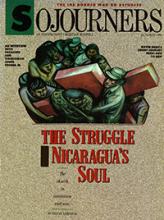One of North America's foremost preachers, James Forbes Jr. has held the Joe R. Engle Professor of Preaching chair at Union Theological Seminary in New York City. Forbes was interviewed in February by Sojourners' Michael Curry at the College of Preachers in Washington, D.C. Two weeks after this interview, Forbes was named pastor of New York's Riverside Church. --The Editors
SOJOURNERS: In what ways has your Pentecostal background influenced your current understanding of ministry and theology?
JAMES FORBES JR.: My Pentecostal background has given me a kind of focus on personal response to the challenge of the faith. To be Pentecostal means that you have to give evidence that you are willing to let the Holy Spirit come into your life, seize the nerve centers of consent, and provide guidance for your life, both your life of worship and your life in the workaday world. The Pentecostal emphasis on faith that makes a difference in daily life is very strong with me.
Also the issue of empowerment is very central to my understanding of ministry. The Holy Spirit empowers us to bear witness to that which we have heard in the gospel. I continue to feel that as a very special part of the way I think and respond to life's challenges.
Who has been the most influential in your development, both personally and theologically?
Usually, as a theologian, one asks which volumes of systematic theology you read, in order to know who you are and where you are going. For me, the influence of the people who were attempting to bear witness to the faith when I was a child made a significant difference.
Read the Full Article

